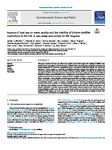Impacts of land use on water quality and the viability of bivalve shellfish mariculture in the UK: A case study and review for SW England
| dc.contributor.author | Webber, JL | |
| dc.contributor.author | Tyler, CR | |
| dc.contributor.author | Carless, D | |
| dc.contributor.author | Jackson, B | |
| dc.contributor.author | Tingley, D | |
| dc.contributor.author | Stewart-Sinclair, P | |
| dc.contributor.author | Artioli, Y | |
| dc.contributor.author | Torres, R | |
| dc.contributor.author | Galli, G | |
| dc.contributor.author | Miller, PI | |
| dc.contributor.author | Land, P | |
| dc.contributor.author | Zonneveld, S | |
| dc.contributor.author | Austen, Melanie | |
| dc.contributor.author | Brown, AR | |
| dc.date.accessioned | 2022-01-20T12:14:35Z | |
| dc.date.available | 2022-01-20T12:14:35Z | |
| dc.date.issued | 2021-12 | |
| dc.identifier.issn | 1462-9011 | |
| dc.identifier.issn | 1873-6416 | |
| dc.identifier.uri | http://hdl.handle.net/10026.1/18590 | |
| dc.description.abstract |
This paper examines how land use affects water quality and how this impacts the viability of shellfish mariculture (marine aquaculture) in the UK through a synthesis of the current literature, stakeholder workshops and targeted engagement of cross-sector organisations across a case study in South West England. We examine the importance of water quality as a constraint for shellfish mariculture in South West England and explore how current and projected future land uses are likely to influence ongoing viability. Currently, faecal material from agricultural runoff and municipal wastewater discharges is the main water quality issue affecting the viability of shellfish mariculture. Most UK Shellfish Waters, including those in SW England (~90%), do not consistently meet regulatory standards for faecal indicator organisms (FIOs) in shellfish, designed to ensure they are safe for direct human consumption. Other pollutants currently impacting shellfish mariculture include persistent organic pollutants and metals, suspended solids and excess nutrient inputs. Emerging pollutants with the potential to impact on mariculture include a range of consumer- industrial- and agri- chemicals, including biocides, pesticides, veterinary and human medicines. We evaluated possible changes in water quality conditions through deriving and exploring a range of future scenarios, considering policies and trends in land use including regenerative and intensive agriculture, renewable energy generation, afforestation, urban development and climate change. Our findings highlight possible trade-offs and synergies between land and water-based food production systems, applicable in SW England and across other regions of the UK and internationally, for helping to inform environmental policy development and implementation. | |
| dc.format.extent | 122-131 | |
| dc.language | en | |
| dc.language.iso | en | |
| dc.publisher | Elsevier | |
| dc.subject | Aquaculture | |
| dc.subject | Bivalves | |
| dc.subject | Land-use | |
| dc.subject | Mariculture | |
| dc.subject | Water-quality | |
| dc.title | Impacts of land use on water quality and the viability of bivalve shellfish mariculture in the UK: A case study and review for SW England | |
| dc.type | journal-article | |
| dc.type | Journal Article | |
| plymouth.author-url | https://www.webofscience.com/api/gateway?GWVersion=2&SrcApp=PARTNER_APP&SrcAuth=LinksAMR&KeyUT=WOS:000708822900010&DestLinkType=FullRecord&DestApp=ALL_WOS&UsrCustomerID=11bb513d99f797142bcfeffcc58ea008 | |
| plymouth.volume | 126 | |
| plymouth.publication-status | Published | |
| plymouth.journal | Environmental Science and Policy | |
| dc.identifier.doi | 10.1016/j.envsci.2021.09.027 | |
| plymouth.organisational-group | /Plymouth | |
| plymouth.organisational-group | /Plymouth/Faculty of Science and Engineering | |
| plymouth.organisational-group | /Plymouth/Faculty of Science and Engineering/School of Biological and Marine Sciences | |
| plymouth.organisational-group | /Plymouth/REF 2021 Researchers by UoA | |
| plymouth.organisational-group | /Plymouth/REF 2021 Researchers by UoA/UoA14 Geography and Environmental Studies | |
| plymouth.organisational-group | /Plymouth/REF 2021 Researchers by UoA/UoA14 Geography and Environmental Studies/UoA14 Geography and Environmental Studies MANUAL | |
| plymouth.organisational-group | /Plymouth/Users by role | |
| plymouth.organisational-group | /Plymouth/Users by role/Academics | |
| plymouth.organisational-group | /Plymouth/Users by role/Researchers in ResearchFish submission | |
| dcterms.dateAccepted | 2021-09-30 | |
| dc.rights.embargodate | 2022-1-21 | |
| dc.identifier.eissn | 1873-6416 | |
| dc.rights.embargoperiod | Not known | |
| rioxxterms.funder | Natural Environment Research Council | |
| rioxxterms.identifier.project | South West Partnership for Environment and Economic Prosperity (SWEEP) | |
| rioxxterms.versionofrecord | 10.1016/j.envsci.2021.09.027 | |
| rioxxterms.licenseref.uri | http://www.rioxx.net/licenses/all-rights-reserved | |
| rioxxterms.licenseref.startdate | 2021-12 | |
| rioxxterms.type | Journal Article/Review | |
| plymouth.funder | South West Partnership for Environment and Economic Prosperity (SWEEP)::Natural Environment Research Council |


